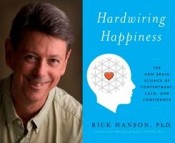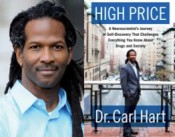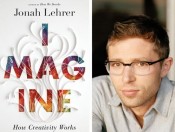Free Forum Q&A: RICK HANSON, author of Hardwiring Happiness
Written on December 31st, 2013 |
Aired: 12/29/13
My guest this week is RICK HANSON, neuropsychologist, and author of the best-seller BUDDHA’S BRAIN. We’re going to talk about his latest book, HARDWIRING HAPPINESS, where he brings together mindfulness and neuroscience and offers pro-active practices to actually shift the brain’s neural structure – the hardwiring – toward calm, contentment, and confidence.
This time of year can be challenging for people. Holidays bring us in contact with family, which for many carries a charge. We’re all asked to be more social than usual. We need a story to tell. And it feels natural to take stock and self assess at the end and beginning of a calendar year. We can be hard on ourselves.
Rick Hanson and I are going to talk about how you can use new lessons science is learning about the brain to overcome it’s — so far evolutionarily successful — negativity bias – the brain’s tendency to hardwire negative and threatening experiences more easily, more quickly than positive ones. It’s important that you avoid predators. And the ones who didn’t had fewer children.
Q&A w/ author, Carl Hart – HIGH PRICE: A Neuroscientist’s Journey of Self-Discovery that Challenges Everything You Know about Drugs and Society
Written on June 18th, 2013 |
Aired: 06/16/13
This week’s guest, neuroscientist CARL HART grew up in one of Miami’s toughest neighborhoods and, in his first book, HIGH PRICE, he explores how it is that he avoided becoming one of the crack addicts he now studies.
Columbia University’s first tenured African American professor in the sciences, Hart goes beyond disputing myths, falsehoods, and ignorance about drugs, drug users, and drug policy. He has been engaged in cutting edge research since the late 90s, testing individuals with actual drugs. His controversial work is redefining our understanding of addiction. He examines the relationships between drugs, pleasure, choice, and motivation, both in the brain and in society. Hart’s findings shed new light on issues of race, poverty, and drugs, and help explain perhaps more clearly than ever why current policies are doomed to fail.
www.highpricethebook.com
Q&A: JONAH LEHRER, Author, NYT #1 Best-Seller – IMAGINE: How Creativity Works
Written on April 11th, 2012 |
Aired 04/08/12
Do you consider yourself to be creative? Do you think of creativity as a gift, a talent, something you either have or you don’t? Do you find creativity to be a bit mystical or magical, dependent on luck, the muses, or higher powers?
Today’s guest, JONAH LEHRER, has written a book in which he looks at the latest brain science and attempts, in his words, “to collapse the layers of description separating the nerve cell from the finished symphony, the cortical circuit from the successful product.”
In Imagine: How Creativity Works, Lehrer makes clear, “Creativity shouldn’t seem like something otherworldly. It shouldn’t seem like a process reserved for artists or inventors or other “creative types.” After all, he points out, the human mind has the creative impulse built into its operating system, hard-wired into its most essential programming code.” Creativity is a variety of distinct thought processes that we can all learn to use more effectively. In the book, Lehrer reveals the importance of embracing the rut, thinking like a child, and daydreaming productively. He also shows how we can use this knowledge to make our neighborhoods more vibrant, our companies more productive, and our schools more effective.
Q&A: RICHARD DAVIDSON, DAVID EAGLEMAN, and PETER BAUMANN
Written on March 15th, 2012
 |
Aired 03/11/12
RICHARD DAVIDSON, author,
The Emotional Life of Your Brain
DAVID EAGLEMAN, author,
Incognito: The Secret Lives of the Brain
PETER BAUMANN, convener,
BEING HUMAN 2012
In 1989 I addressed the 20th reunion of my Harvard class. In 1969, we’d spearheaded student protests that led to a month long strike of the University. Our demands included removing ROTC from campus, creation of an African-American studies program, and reforming Harvard’s behavior as a landlord. Twenty years later, I encouraged my classmates to live up to our youthful ideals. I recall focusing on environmental challenges, including the mounting evidence of man-made contributions to climate change. But when asked where we needed to focus our attention to turn things around, I pointed to the environment within our own minds.
Now, over twenty years later, my conversations about politics, economics, technology, ecology, etc. focus more and more on the need to tinker with the human software that drives or interprets everything we do. As we use the tools of science to explore the nature of humanity, we are learning more and more about how our brains function and what motivates our behavior, built-in biases and blind spots. I find myself paying a lot of attention to the fields of behavioral economics, cognitive neuroscience, evolutionary psychology, social anthropology, philosophy – that promise to overthrow long-held biases and stories about what it means to be human.
http://thebaumannfoundation.org
Q&A: VANDANA SHIVA, Physicist, Ecologist, Activist, Editor, & Author
Written on December 27th, 2010 |
Aired 12/26/10
Dr. Vandana Shiva is a physicist, ecologist, activist, editor, and author of many books. In India she has established Navdanya, a movement for biodiversity conservation and farmers` rights. She directs the Research Foundation for Science, Technology and Natural Resource Policy. Her books include Biopiracy: The Plunder of Nature and Knowledge, Stolen Harvest: The Hijacking of the Global Food Supply, and her newest, Soil Not Oil: Environmental Justice in an Age of Climate Crisis. Shiva has been awarded several awards for her efforts including the Right Livelihood Award and the United Nations Environment Program [UNEP] Global 500 Award in 1993, and most recently the 2010 City of Sydney Peace Prize.
